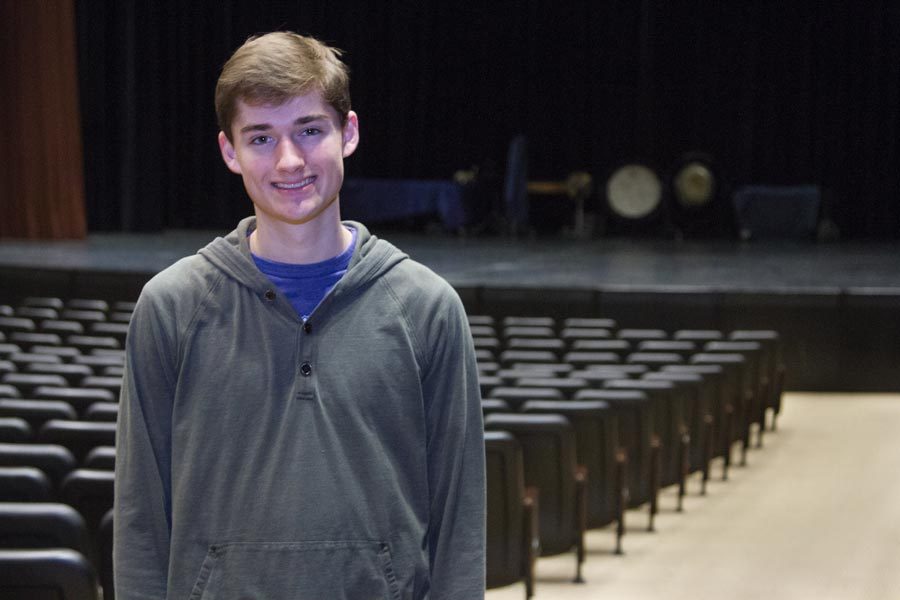Life’s next audition
A closer look at the college application process for one theatrically inclined senior
Photo by Israel Arias
Senior Reece Griffin standing in front of the Sullivan Performing Arts Center where he has often starred.
January 22, 2015
Endless essays. Endless anxiety. Endless Exams. Endless emails. Endless ACTs. Life has not been easy for most seniors in the past few weeks, and for a few seniors, the daunting task of applying to college is even harder.
For students applying to college theatre programs, they must survive applying for their colleges of choice, and then also getting into these school’s Acting and Musical Theatre programs. One of these such students is senior Reece Griffin.
“I have applied for 18 universities and been accepted into nine so far,” Griffin said. “I am auditioning for 19 Musical Theatre programs and 16 Acting programs.”
The first step in the long and frankly grueling process of applying to these programs takes place at home. Prescreen videos are made by actors and actresses as a brief way of showcasing their talents. These videos are then sent to colleges as a first look at the prospective students. Some colleges use these videos to decide who warrants an in-person audition.
“I have done ten prescreen video auditions. These are sent in to help colleges weed out those they don’t need,” Griffin said. “This is decided less upon skill, and relies more upon type. An actor’s type is determined by voice, height, weight, ethnicity, personality and many other things.”
After the prescreen videos come the next step: actual, in-person auditions. For Griffin, each audition is a nerve-wracking process that requires a perfect performance every time. Because each school only sees the actors at these auditions, a single mistake means the difference between a glowing acceptance and a polite denial. Preparation is a necessity.
“These auditions include cuts from multiple songs, monologues and in many cases, scene reading with a partner and a group dance call,” Griffin said. “I have been working towards all this collectively since around January of last year.”
These preparations have included the three major disciplines of stage performance: dancing, singing and acting. A single mistake in any of these disciplines can ruin any chances an actor or actress has of making the cut.
“I have about three hours of dance training per week, a one hour voice lesson every week and extra coaching in acting thrown in here and there,” Griffin said. “Along with this, I train on my own in my free time practicing all three disciplines.”
All of this practice comes together into an impressive repertoire for Griffin. Every actor or actress collects a number of songs and monologues that he or she must be able to perform at a moment’s notice at an audition. These songs and monologues include a variety of genres, from humorous to tragic to everything in between.
“Right now for my audition rep., I have a total of ten songs and five monologues memorized,” Griffin said. “I’m adding on to and subtracting away from it constantly to cater to what the colleges require.”
All of that effort, however, is wasted if an actor or actress is not accepted into a program. Competition for a spot in the top musical theatre and acting programs around the nation is steep.
“Even after all the work, there is still only a one percent chance in most cases that you’ll get accepted into the higher tier programs,” Griffin said. “After the video and in person auditions, the waiting is practically unbearable. I live through every minute with anxiety, praying that one of these programs will find some kind of want for me.”
Despite the work, anxiety and passion that goes into his performing art, Griffin maintains that it is worth it.
“Musical Theatre and Acting aren’t exactly the easiest professions to get into or make a living with,” Griffin said. “But I give you a quote from David Mamet’s novel True and False: Heresy and Common Sense for the Actor: ‘It is not childish to live with uncertainty, to devote oneself to a craft rather than a career, to an idea rather than an institution,’ Mamet described. ‘It’s courageous and requires a courage of the order that the institutionally co-opted are ill equipped to perceive.’”















